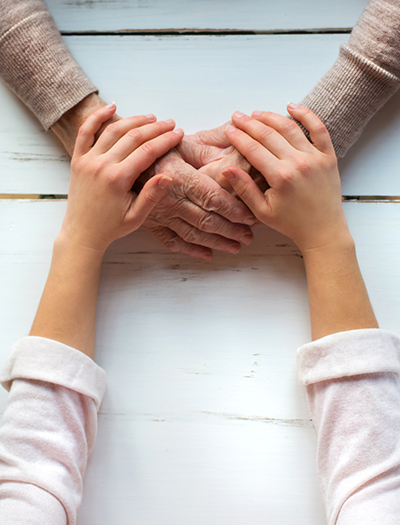Your role as a caregiver encompasses many aspects of care
 As a caregiver, you are a part of the cancer care team. Members of the care team include other family and friends, and the medical team in charge of treatment. You may find yourself working closely with the medical care team, and may do things like: giving drugs, managing side effects, reporting problems, keeping friends and family informed, and helping determine whether treatments are working.
As a caregiver, you are a part of the cancer care team. Members of the care team include other family and friends, and the medical team in charge of treatment. You may find yourself working closely with the medical care team, and may do things like: giving drugs, managing side effects, reporting problems, keeping friends and family informed, and helping determine whether treatments are working.
Caregivers often find themselves keeping track of prescriptions, tests to be done, and communicating with doctors and nurses. They are often the ones who are keeping things organized, preventing any mix-ups and keeping track of paperwork.
As a caregiver, you are a vital resource to your loved one. You are the one that will know best what is going on with them. During appointments, ask questions and take notes, learn who the care team is and how to contact them. Your loved one will need your help to find the right support and the information they need.
Caregiver responsibilities include day-to-day care, too
In addition to providing help with medical appointments and care, caregivers also provide help with daily activities.
This can include:
- Taking care of grocery shopping and meal preparation
- Making sure your loved one is eating
- Ensuring medicine is being taken on time
- Bathe and ensuring other personal care needs are being met
- Take care of household chores and cleaning
- Make sure any bills are being paid
- Provide transportation to and from doctor’s appointments, tests, and treatment
- Take care of any medical problems at home, coordinate cancer care, and determine when to contact health professionals for new problems.
As a caregiver, you also need time to care for yourself
While much of your time may be taken up in the care of your loved one, it’s important to also ensure you are caring for your own needs. While you may feel a little selfish, thinking about yourself will help you get through tough times. By taking care of yourself, you can be a better, more effective caregiver.
As a caregiver, you may experience a range of emotions, and periods of stress, anxiety, depression, and frustration. You may feel angry, guilty, alone, afraid, and/or sad.
If you feel any of the following, you may be experiencing stress:
- Feeling tired all the time
- Getting sick more than usual
- Not sleeping enough
- No longer enjoying hobbies or activities you once did
- Withdrawing from people
- Feeling impatient, irritable, or forgetful
In the case that you are feeling constant stress, it’s important that you seek help from others. It may become necessary to hire help, either someone to help with the care of your loved one or people to help with chores, errands, or childcare. You may also be able to ask help from friends and family. If you are religious or a part of a community group, you may find people who are willing to help out. If they offer, accept help and assign specific tasks that will lighten your load.
Take some time for yourself as well. Spend time with other people you care about or do something you enjoy doing. Taking a break to support your own needs is crucial for your wellbeing. If you find yourself struggling with bouts of anger or frustration, try to express your emotions in a positive way. Talk through feelings with friends, exercises, or start a journal as an outlet for frustrations.
